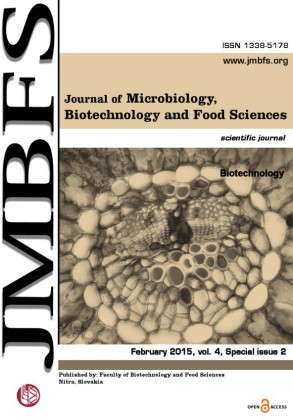OVARIAN HORMONE PRODUCTION AFFECTED BY AMYGDALIN ADDITION IN VITRO
DOI:
https://doi.org/10.15414/jmbfs.2015.4.special2.19-22Keywords:
Amygdalin, hormone production, ovarian granulosa cellsAbstract
Amygdalin, a natural substance, is a cyanogenic glycoside occurring in the seeds of apricots and bitter almonds. It is a controversial anti-tumor compound that has been used as an alternative cancer drug for many years. Amygdalin is composed of two molecules of glucose, one of benzaldehyde, which induces an analgesic action, and one of hydrocyanic acid, which is an anti-neoplastic compound. This in vitro study was performed to evaluate the possible impact of amygdalin (1, 10, 100, 1000, 10 000 μg/mL) on the secretory activity of granulosa cells (GCs) from porcine cyclic ovaries. The release of progesterone and estradiol-17β by GCs were evaluated by ELISA. In our study, the noticeable changes in estradiol-17β release by ovarian GCs were determined after the amygdalin addition. Amygdalin, at the highest dose (10 000 μg/mL), significantly (P≤0.05) stimulated the release of estradiol-17β by GCs, in comparison to the untreated control cells. On the contrary, no significant (P≥0.05) changes in the progesterone release by GCs caused by amygdalin addition were observed. In conclusion, obtained results showed that the amygdalin application (various doses) to ovarian GCs caused a dose-dependent stimulation of the estradiol-17β release, but not progesterone, and its possible modulatory impact on the steroid production in porcine ovaries.Downloads
Downloads
Published
2015-02-02
How to Cite
Halenár, M., Medveďová, M., Maruniaková, N., & Kolesárová, A. (2015). OVARIAN HORMONE PRODUCTION AFFECTED BY AMYGDALIN ADDITION IN VITRO. Journal of Microbiology, Biotechnology and Food Sciences, 4(special issue 2 (Biotechnology), 19–22. https://doi.org/10.15414/jmbfs.2015.4.special2.19-22
Issue
Section
Biotechnology
License
Copyright (c) 2015 Marek Halenár, MarÃÂna MedveÄová, Nora Maruniaková, Adriana Kolesárová

This work is licensed under a Creative Commons Attribution 4.0 International License.
All papers published in the Journal of Microbiology, Biotechnology and Food Sciences are published under a CC-BY licence (CC-BY 4.0). Published materials can be shared (copy and redistribute the material in any medium or format) and adapted (remix, transform, and build upon the material for any purpose, even commercially) with specifying the author(s).





